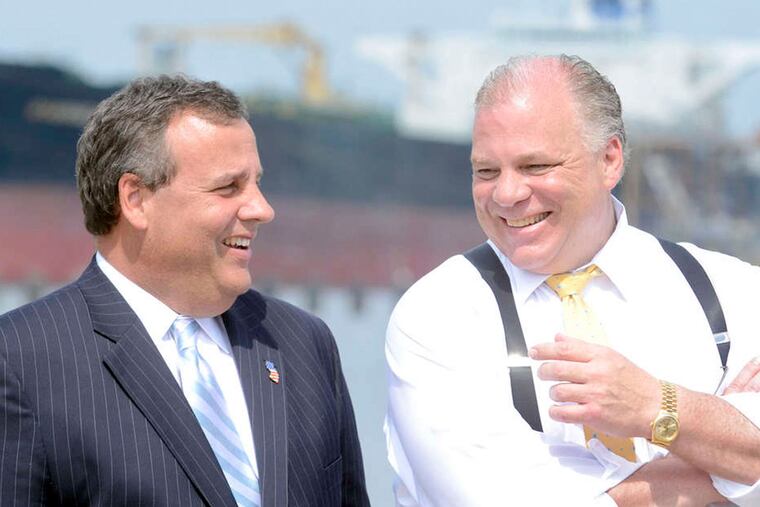Christie hems in Sweeney on unions by ending income-tax agreement with Pa.
TRENTON - Gov. Christie has long benefited from his relationship with Senate President Stephen Sweeney: It was crucial to enacting much of his first-term agenda, including an overhaul of the state pension system and teacher tenure, which boosted the governor's national profile.

TRENTON - Gov. Christie has long benefited from his relationship with Senate President Stephen Sweeney: It was crucial to enacting much of his first-term agenda, including an overhaul of the state pension system and teacher tenure, which boosted the governor's national profile.
Now Christie, a Republican, is trying to exploit Sweeney's political vulnerabilities to extract health-benefit concessions from public-sector unions by threatening to end an income-tax agreement with Pennsylvania that would hit thousands of Sweeney's South Jersey constituents with higher taxes.
Sweeney (D., Gloucester), who is expected to run for governor next year, does not want to further damage his strained relationship with some public-sector unions, which bankroll Democratic campaigns and help turn out the vote.
But Christie has put Sweeney in the difficult position of defending organized labor at the expense of taxpayers in the Senate president's political backyard. The governor has said he could change his mind if Democrats slash public employees' health-care costs.
"Although I'm a union ironworker," Sweeney said in an interview Tuesday, "I'm the Senate president, and I can't shirk that responsibility. I can't come to an agreement on something that I think is going to hurt the state of New Jersey."
Sweeney added: It's Christie's "signature on the letter that raises taxes. Not mine. He ended the agreement, not us."
New Jersey's decades-long personal income tax reciprocity agreement with Pennsylvania has allowed taxpayers to pay income tax in the state where they live, not where they work.
Christie notified Harrisburg on Friday that he was ending the agreement. The governor said the decision was necessary to maintain a balanced budget, as required by the state constitution. The tax agreement is set to expire Jan. 1.
That means married couples earning up to about $113,000 and filing joint returns who live in South Jersey but work in Pennsylvania would pay more income tax - to the Keystone State.
Likewise, Pennsylvania couples working in New Jersey would pay more - to the Garden State - if they earn more than $113,000.
New Jersey's progressive tax structure includes marginal rates ranging from 1.4 percent, for $20,000 or less in income, to 8.97 percent for income above $500,000. Pennsylvania's flat rate is 3.07 percent.
Also, Garden State residents working in Philadelphia would no longer be able to claim a credit for paying the city's wage tax, which is 3.47 percent for nonresidents.
About 250,000 Pennsylvania and New Jersey residents cross the Delaware River for work, according to Census Bureau estimates.
The governor says he may change his mind on the tax deal if Democrats comply with his wishes on health-care costs.
"The Legislature caused this problem by intentionally putting a $250 million hole in the budget to benefit their public employee union bosses. If the Senate president and the speaker don't want this to go forward, then put the residents of South Jersey ahead of the union bosses," Christie spokesman Brian Murray said Saturday.
"It's their choice, and once again, they are picking their union masters over the people of South Jersey. The constitution and the irresponsible actions of Democrats in the Legislature leaves the governor no choice."
Sweeney, who is vice president of an ironworkers union, has opposed public-sector unions on several occasions. He last month accused the state's largest teachers' union of attempting to bribe Senate Democrats over a proposed constitutional amendment that would have mandated greater pension funding. The union has denied wrongdoing.
On Tuesday, Christie told reporters that he would not tap the state's surplus or cut aid to hospitals, education, and other priorities to balance the budget: "Would they like me to short the pension payment?"
Sweeney says he's unfazed by the governor's tactics.
"When I'm not willing to agree, we don't agree," Sweeney said, citing, for example, his rejection of Christie's proposal to replenish the state's fund for road, bridge, and rail projects over concerns that an accompanying sales-tax cut would blow a hole in the budget.
Their failure to reach an agreement means construction workers - who belong to politically powerful private-sector unions - are out of work.
In the budget Christie proposed in February for the fiscal year that began in July, he called for the plan design committees that oversee public workers' health plans to find $250 million in savings, without specifying how. Committee membership is divided equally among union and administration representatives.
In its own budget, the Democratic-controlled Legislature included similar language but did not give Christie the authority to circumvent the design committees to cut health-care costs. Under the constitution, Christie can veto any line item from the budget, but he cannot add language.
Sweeney says the unions have proposed reasonable ideas to cut costs, including pushing for a contractor that would conduct a forensic audit of the state's prescription-drug program.
"We're all for reforming health care," he said.
856-779-3846 @AndrewSeidman